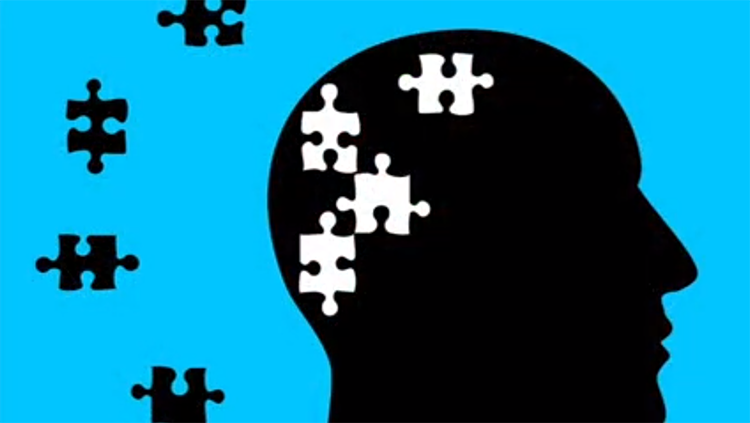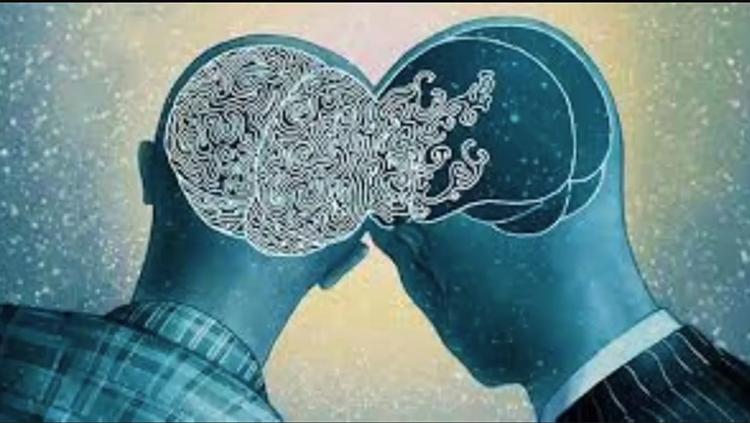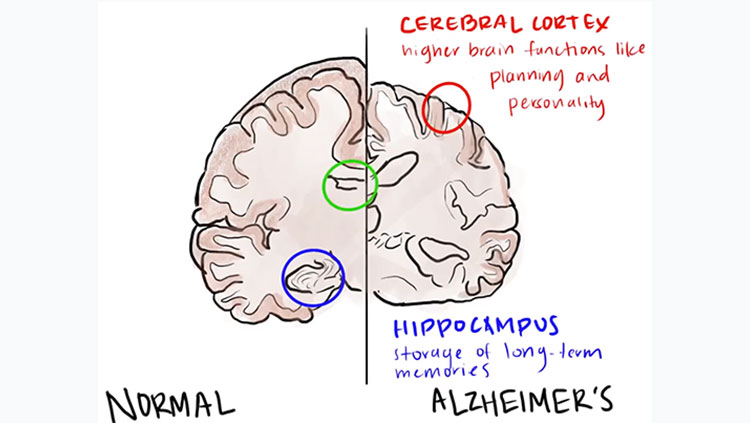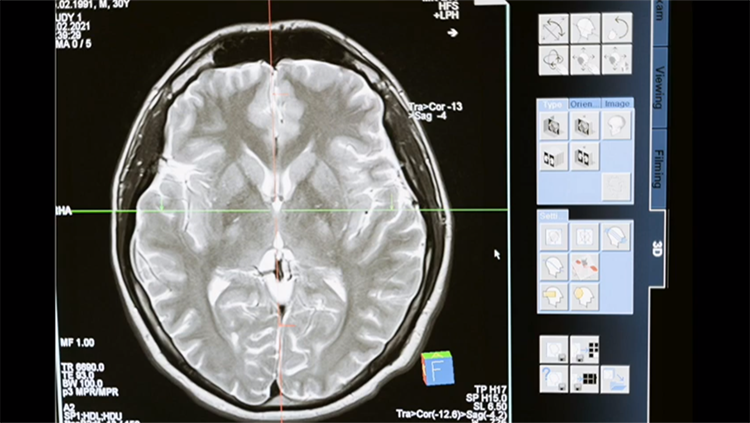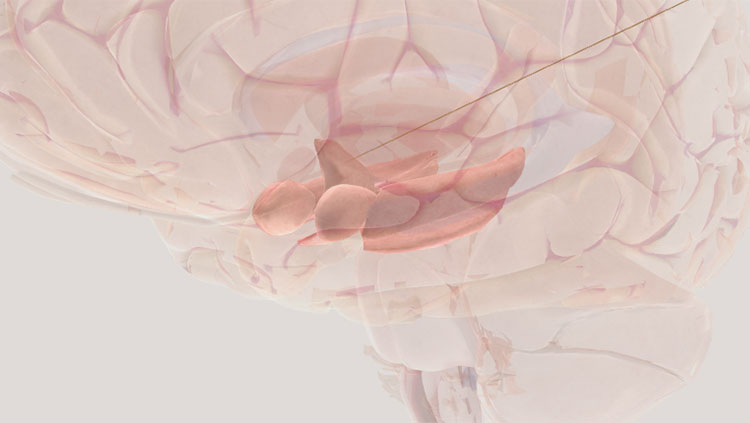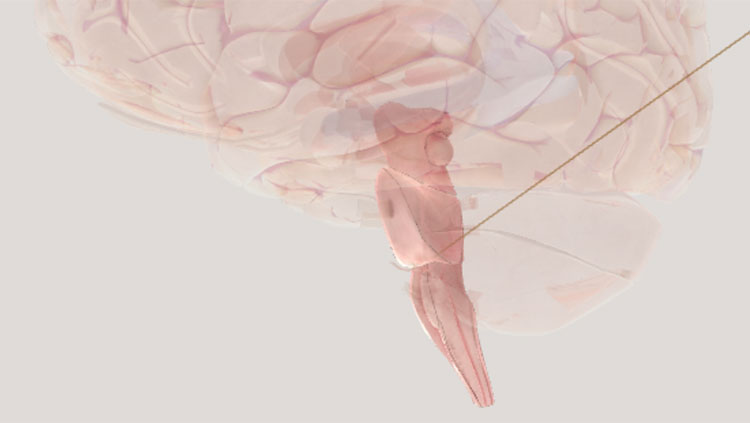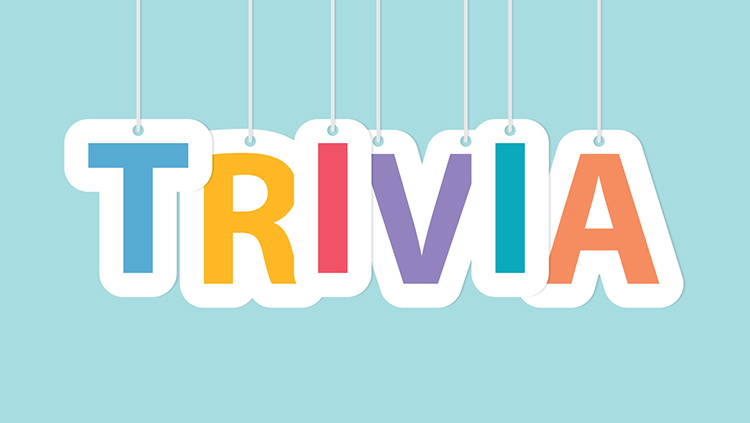Music as Therapy
- Published17 Jan 2019
- Reviewed17 Jan 2019
- Author Eve Glicksman
- Source BrainFacts/SfN
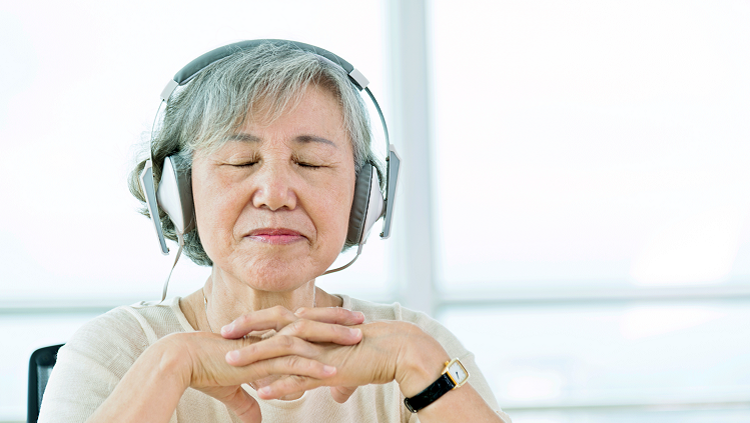
In 1978, Concetta Tomaino witnessed something remarkable: as she played music for people with advanced dementia, they lit up and began singing.
While dementia patients may not be able to name a familiar song, they can sing or hum it. In other words, “nonverbally, there is a level of knowing,” says Tomaino, a music therapist and the co-founder and executive director of the Institute for Music and Neurologic Function in Mount Vernon, New York. “Music provides the priming that stimulates other areas of recognition.”
Now, scientists are closer to understanding why people with dementia respond so well to familiar music when they remember little else. And they’re uncovering the potential therapeutic benefits of music.
This Is Your Brain on Music
When we listen to music, multiple brain systems come online: those decoding sound and language, processing emotions and reward, and planning movements.
Long after losing the ability to speak, dementia patients may still sing or hum a favorite song. That’s because the part of the brain that responds to familiar music is the last to atrophy and succumb to dementia.
In 2018, neuroscientists at the University of Utah scanned the brains of dementia patients while they listened to music. An area located just under the crown of the head called the supplementary motor area became active in response to familiar tunes. What’s more, music triggered other regions of the brain to “talk to each other,” promoting greater connectivity between them. Stronger connectivity is associated with cognitive functions like language, memory, and others. That finding suggests “a concrete pathway that may explain why and how music might help brain function,” says study coauthor Jeffrey Anderson.
And, the effects persist for some time even after the music stops. While it’s not clear for how long these patients’ brains experience increased connectivity, Anderson notes the fact that they do could lead to broader strategies for slowing or stopping the cognitive decline caused by Alzheimer’s.
Music as Therapy
And, we need desperately to develop new strategies. Roughly 5.7 million people in the U.S. have Alzheimer’s disease, the most common form of dementia which disrupts memory, thinking, and behavior. By 2050, that number is expected to climb to 14 million.
Despite years of clinical trials, there hasn’t been a lot of success in combating Alzheimer’s disease and other forms of dementia. The approved medications for treating Alzheimer’s only lessen symptoms like memory loss and confusion for a limited time in some people. They fail entirely to stop or slow its course.
“Families of Alzheimer’s patients are very eager for drug therapies, but we won’t see anything new for the next few years,” says Borna Bonakdarpour a neurologist at Northwestern University’s Mesulam Center for Cognitive Neurology and Alzheimer’s Disease. Because clinical trials can take more than a decade, caregivers should focus on ways to improve day-to-day life for people with dementia, says Bonakdarpour.
Music therapy is emerging as a method to manage symptoms such as depression, anger, and agitation.
As dementia progresses, patients often begin losing social connections, become less engaged, and experience dramatic mood swings. Bonakdarpour is leading a study to see whether music can help. Each week, residents of a memory care facility attend a live concert with caregivers during which they are encouraged to sing along, dance, or tap out the beat with drums and tambourines.
“You see patients who don’t talk or do much, but when music is played, they wake up and try to dance. It’s very impressive,” Bonakdarpour says.
Families of the patients reported their loved ones were more motivated and talkative after the music sessions and needed less medication for agitation, Bonakdarpour says. Follow-up studies will help determine how long the effects last.
Bonakdarpour’s group isn’t the only one that has found music can improve mood and behavior in dementia patients. In 2017, researchers from Brown University tracked 25,000 nursing home residents with dementia over a six-month period. Residents who had participated in an individualized music program used less antipsychotic and antianxiety drugs and had fewer behavioral problems. A 2018 review of 22 clinical trials by Dutch researchers concluded that music therapy was most effective for relieving depression and behavior problems in people with dementia.
“Music doesn’t cure or change outcomes, but it makes a difference in helping people function,” Anderson says. “Small differences in brain function can have outsized importance.” For people who are losing contact with the world, anything that can improve attention and engagement is valuable, Anderson says. “Music allows you to break through noise and reach the brain in ways other stimuli can’t.”
CONTENT PROVIDED BY
BrainFacts/SfN
References
Clark, C. N., & Warren, J. D. (2015). Music, memory and mechanisms in Alzheimer’s disease. Brain, 138(8), 2122–2125. doi:10.1093/brain/awv148
Devere, R. (2017). Music and Dementia: An Overview. Practical Neurology, 31–35. http://practicalneurology.com/2017/06/music-and-dementia-an-overview¢er=37
Fang, R., Ye, S., Huangfu, J., & Calimag, D. P. (2017). Music therapy is a potential intervention for cognition of Alzheimer’s Disease: a mini-review. Translational Neurodegeneration, 6(1). doi:10.1186/s40035-017-0073-9
Gómez Gallego, M., & Gómez García, J. (2017). Music therapy and Alzheimer’s disease: Cognitive, psychological, and behavioural effects. Neurología (English Edition), 32(5), 300–308. doi:10.1016/j.nrleng.2015.12.001
Maguire, L. E., Wanschura, P. B., Battaglia, M. M., Howell, S. N., & Flinn, J. M. (2015). Participation in Active Singing Leads to Cognitive Improvements in Individuals with Dementia. Journal of the American Geriatrics Society, 63(4), 815–816. doi:10.1111/jgs.13366
Thomas, K. S., Baier, R., Kosar, C., Ogarek, J., Trepman, A., & Mor, V. (2017). Individualized Music Program is Associated with Improved Outcomes for U.S. Nursing Home Residents with Dementia. The American Journal of Geriatric Psychiatry, 25(9), 931–938. doi:10.1016/j.jagp.2017.04.008
van der Steen, J. T., Smaling, H. J., van der Wouden, J. C., Bruinsma, M. S., Scholten, R. J., & Vink, A. C. (2018). Music-based therapeutic interventions for people with dementia. Cochrane Database of Systematic Reviews. doi:10.1002/14651858.CD003477.pub4
Also In Neurodegenerative Disorders
Trending
Popular articles on BrainFacts.org



.jpg)

